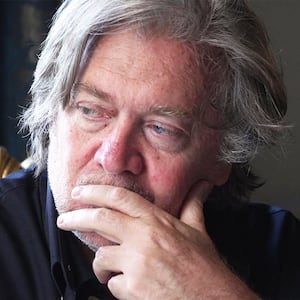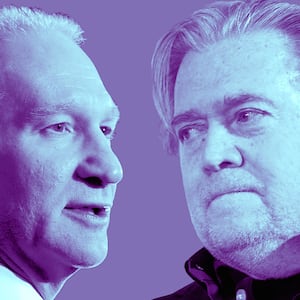Midway through The Brink, a Republican woman recounts how she showed her friend “Trump @ War”—an hour-long pro-Trump film produced by Steve Bannon—and that the viewer found it to be not only enlightening, but also fair, balanced, and far from propaganda. Which is funny, because earlier in director Alison Klayman’s incisive documentary, Bannon himself describes his work thusly: “It’s a piece of propaganda. I consider propaganda to be positive.”
And lest one think he doesn’t know what he’s peddling, he also opines about the film—in a nod to Nazi Germany’s chief propagandist—“What would Leni Riefenstahl do?”
Bannon may be the poster child for far-right “populism” and “economic nationalism”—euphemistic slogans for neo-fascism and neo-Nazism—but The Brink (in theaters March 29) is no puff piece on the founder of Breitbart News, whose role in the Trump campaign, and subsequent stint as White House Chief Strategist, helped make him an extremist celebrity power broker. Director Klayman’s film is a revealing and horrifying snapshot of her subject during 2017 and 2018, culminating with the midterm elections that saw the Democratic Party re-take control of the House of Representatives. An intimate fly-on-the-wall portrait, it details Bannon’s efforts to further foster the reactionary movements spreading across Europe. In doing so, it lets him hang himself with his own words.
That occurs from the outset of The Brink, with Bannon discussing his 2016 feature Torchbearer (whose title he can barely recall, and which starred Duck Dynasty’s Phil Robertson). Reminiscing about the production’s various overseas locations, he talks about how he travelled to the Auschwitz concentration camp (“My shit in Auschwitz rocked!”), where he found himself surprisingly unmoved. Instead, he was bowled over by his tour of Birkenau, which he describes as “the most haunting place I think I’ve ever been.” His voice then gets excited, and his eyes light up, as he begins explaining how Birkenau was built from scratch by the Nazis: “It’s precision engineering to the nth degree…It’s an institutionalized industrial compound for mass murder.” It’s clear he was, and remains, tremendously impressed by the craftsmanship of the facility, and the means by which its German designers and engineers “detached themselves from the moral horror of it.”
Then, as Klayman cuts to footage of the White House and National Mall monuments, Bannon continues, “That’s when you realize, oh my god, humans can actually do this. Humans that are not devils, right? Humans that are just humans.”
The Brink is confirmation of that statement, as Bannon proves to be the embodiment of Hannah Arendt’s “banality of evil.” A shlub with a sharp sense of humor, a jovial attitude, and a habit of commending—if not actively trying to make peace with—critics who challenge his views to his face, Bannon superficially comes across as a provocative strategist and media personality more than a malevolent monster pushing a racist, sexist, xenophobic agenda. When The Guardian reporter Paul Lewis forcefully presses him on the issue of George Soros, whose name Bannon and others use as a “dog whistle” for anti-Semites, Bannon acts hurt at the accusation, and denies it both on and off the record. And on stage at a Toronto debate with David Frum, he endures boos with a smirk, and then gets a big laugh by responding to a distant smattering of applause with “Thanks, mom.”
Bannon employs mirth to make his malice go down smoother, all while roundly refuting the notion that he’s spewing intolerance. As is frequently the case in The Brink, however, it’s only a matter of time before he shows his true colors. No matter his contention that attacks on Soros (and globalists) isn’t anti-Semitic, Bannon confesses that “Hate is a motivator. Anger is a motivator.” Hate is certainly something Bannon sells by the boatload, eagerly and knowingly, such that when he slams Democrats for using identity politics (a losing strategy, in his opinion), and Klayman then makes him admit that he’s doing the same thing by embracing the term “deplorables,” he can only chuckle and concede that “outrage culture” works.
Per its title, The Brink presents Bannon as a key individual pushing the world toward the precipice of fascism, which he aims to incite and empower by creating a unified coalition of right-wing factions in France, Italy, Poland, Belgium and elsewhere. It’s a movement Bannon believes is “a global revolution. And I’m very lucky to be at the vanguard. It’s something worth dedicating your life to.” That quote follows Bannon and Republicans’ huge losses in the 2018 midterms, and the proclamation lingers, chillingly, in the air. Klayman’s film recognizes that Bannon and Trump’s dogma has taken root around the world, and won’t be annihilated by minor congressional setbacks—even if they do frustrate Bannon enough to make him bang his head against a kitchen cabinet, as seen in a scene from the night before the 2018 election.
“Donald Trump is a historical figure. And Donald Trump is a transformational president. And Donald Trump is going to be in your personal life thirty years from now,” Bannon asserts. In light of ongoing events which suggest that the president may escape catastrophic harm from Robert Mueller’s long-awaited report, The Brink feels like depressing evidence of that fact. Klayman includes telling clips of Bannon conceding that his stays at five-star hotels are going to rankle his working-class acolytes, and bragging about how he’s going to convert twenty percent of The Guardian’s left-leaning readers to his cause. Yet what resounds most forcefully is his commitment to his “global revolt,” which he firmly believes puts him “on the right side of history”—and which he defines in stark us-versus-them terms, telling anyone who listens that “they want to take your voice away” and that it’s time to “take out the sword and throw away the scabbard.”
In that regard, The Brink isn’t just about how close we are to a right-wing revolution; it’s about our frightening proximity to outright conflict, courtesy of Bannon and his ilk, who want to “fight the establishment” by stoking mankind’s ugliest impulses. As we’ve seen with Charlottesville’s “Unite the Right” rally, the slaughter at Pittsburgh’s Tree of Life synagogue, and now the mass shooting in Christchurch, New Zealand, it’s rhetoric—and ideology—with deadly consequences.








